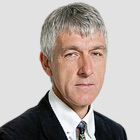The pound fell heavily after the the Bank of England wrongfooted the City by leaving interest rates at their record low level of 0.1%, despite forecasting a jump in inflation to 5% by next spring.
Sterling dropped by more than two cents against the US dollar when it emerged that only two members of Threadneedle Street’s nine-member monetary policy committee voted for a rise, confounding expectations of an increase in the cost of borrowing to 0.25%.
Andrew Bailey, the Bank’s governor, said the decision was a “very close call” and put the City on notice that interest rates were likely to rise from the lowest level in the Bank’s 327-year history over the coming months.
Markets took the governor’s comments to mean that the first increase in borrowing costs since 2018 would come either in December or, more probably, in February next year.
Dean Turner, an economist at UBS global wealth management, said: “With markets on tenterhooks, in the end, the decision wasn’t even close. Despite very hawkish language of late, from the governor in particular, the Bank of England kept interest rates on hold by a majority of 7-2. The market reaction is telling, with sterling down sharply after the announcement and gilts rallying.”
The pound was trading at just under $1.35 in late London trading.
The Bank said the respite from higher rates might prove temporary, warning that if the economy performed as it expects, “it will be necessary over the coming months” to raise rates to hit the government’s 2% target. Yet it pushed back against the City’s belief that borrowing costs will reach 1% by the end of 2022.
“At its recent meetings, the committee has judged that some modest tightening of monetary policy over the forecast period (the next three years) was likely to be necessary to meet the 2% inflation target sustainably in the medium-term,” minutes of the MPC meeting showed. “The latest developments, set alongside the committee’s updated projections, reinforce this view.”
The MPC said it expected inflation as measured by the consumer prices index to be driven up by the recent surge in the cost of energy to peak at 5% in April then to fall back “materially” from the second half of 2022 as energy prices came down.
In its quarterly monetary policy report, the Bank said there was more inflationary pressure than it had predicted in August even though the economy was growing more slowly.
Supply chain bottlenecks and weaker consumer spending have resulted in the Bank halving its growth forecast in the third and fourth quarters of 2021. Growth is expected to be 1.5% in the third quarter and 1% in the final three months of the year.
Most of the downward revision was caused by supply chain disruption, but the Bank also noted that retail sales had fallen for five successive months and consumer confidence had weakened.
The MPC now thinks it will take until the first three months of 2022 – a quarter later than it previously thought – for the economy to regain all the ground lost during the Covid-19 pandemic.
According to the minutes, seven MPC members wanted to wait and see what happened to unemployment following the end of the furlough scheme before deciding whether a rate rise was needed.
“Current elevated global cost pressures were still most likely to prove transitory, leading to a one-off increase in consumer prices rather than persistently higher inflation rates”, the majority of the committee said.
The two dissenting MPC members – Sir Dave Ramsden and Michael Saunders – said there was no sign that the end of wage subsidies this autumn had eased strains in the labour market and that inflation was likely to remain above 2% unless policy was tightened.
Samuel Tombs, the UK economist at Pantheon Macroeconomics, said: “We continue to expect the MPC to hold tight again in December and wait until February to hike Bank rate, but the call remains finely balanced.”











